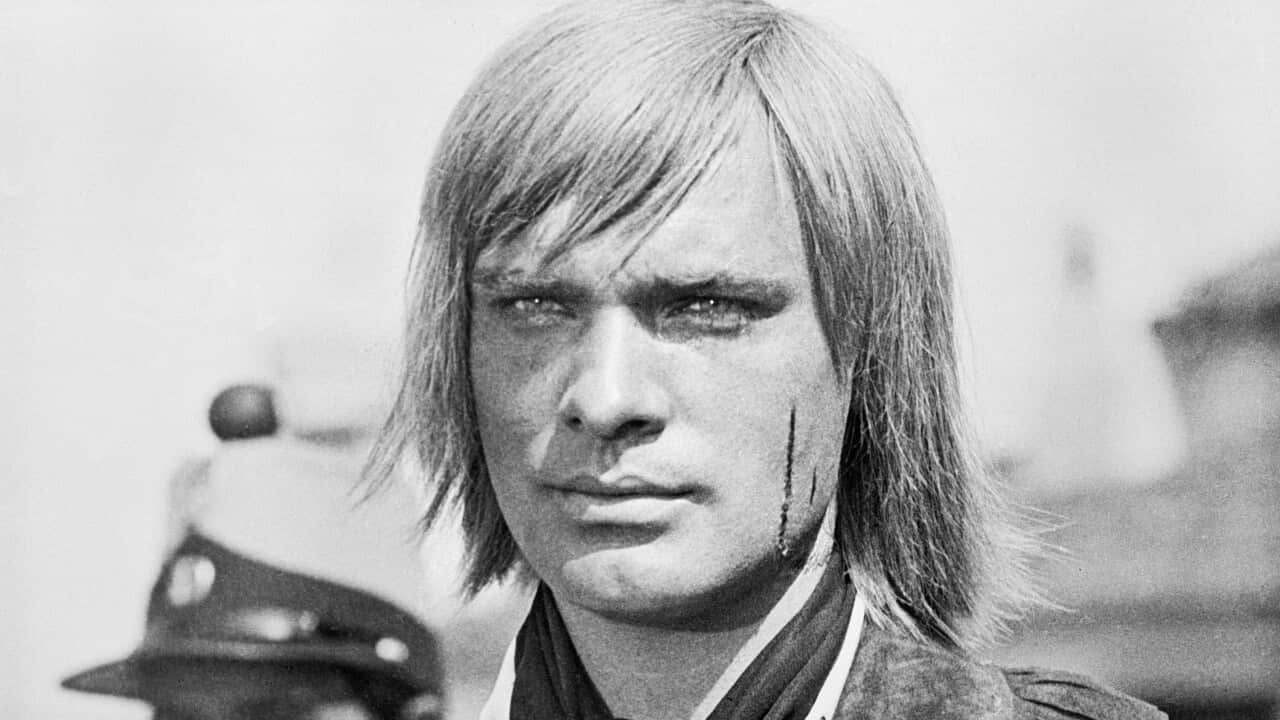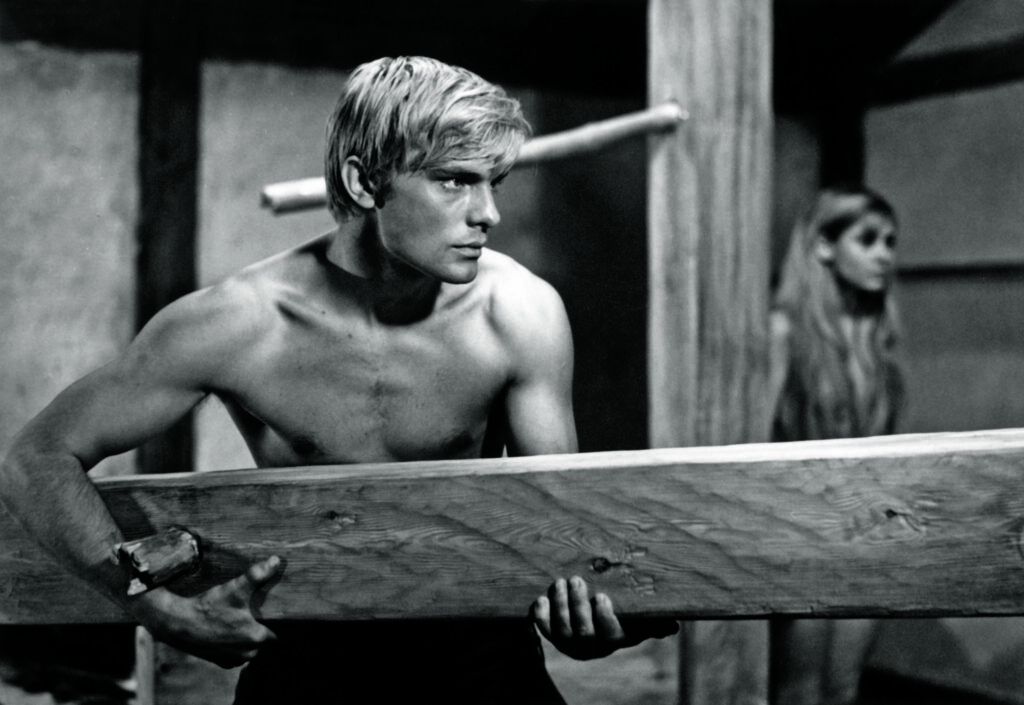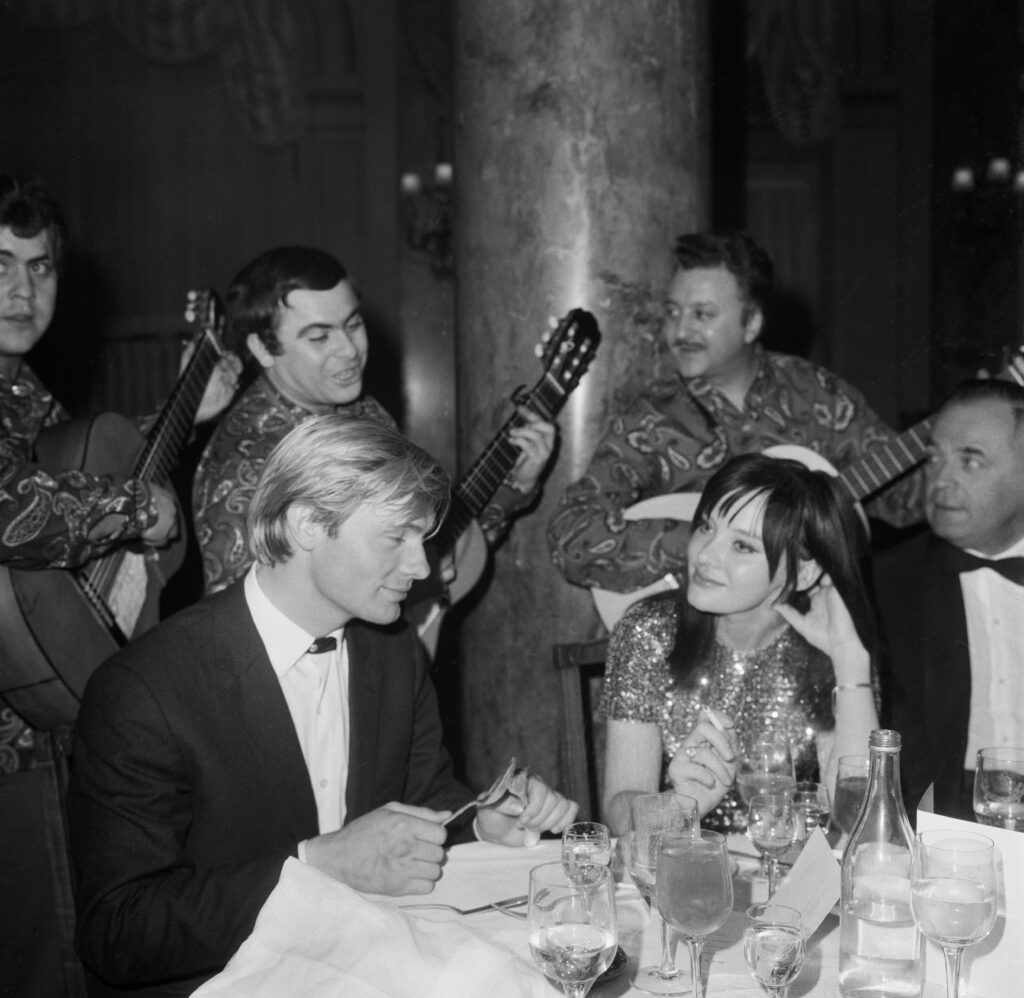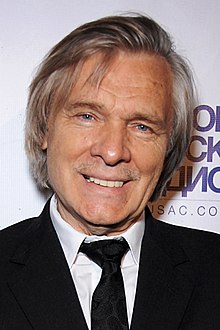Oleg Vidov
Oleg Borisovich Vidov (Russian: Олег Борисович Видов; June 11, 1943 – May 15, 2017) was a Russian–American actor, film director and producer. He appeared in 50 films beginning in 1961. A emigrant from his native Soviet Union, he was granted U.S. citizenship and became a naturalized American.[1]
Oleg Vidov was born in either the Leninsky District, Moscow Oblast or Vidnoye, Moscow Oblast[2][3] to Varvara Ivanovna Vidova, a teacher and a school principal, and Boris Nikolaievich Garnevich, an economist and a Finance Ministry deputy. According to Garnevich's fifth wife, Irina Vavilova, Garnevich was an influential man and served as an assistant of Lazar Kaganovich.[4] Vidov was raised by his mother under her surname. He spent his childhood in Russia, Mongolia and East Germany where his mother was assigned to work. When she was sent to China, he went to live with his aunt Anuta in Kazakhstan near the Chinese border. Eventually all of them moved to Moscow.[5]
Vidov played his first episodic role in 1960 in the teen drama My Friend, Kolka![6] In 1962 he entered actor's courses at VGIK led by Yakov Segel and Yuri Pobedonostsev.[3]
As a student he acted in a number of movies, including main parts in The Blizzard and An Ordinary Miracle (both from 1964). He graduated in 1966 and continued his active movie career. He was also noticed by foreign directors and was given permission to perform in such films as Hagbard and Signe (by Denmark, Sweden and Iceland) and Battle of Neretva (by Yugoslavia, Italy, West Germany and the United States), as well as a joined Soviet-Italian-American production Waterloo.
In 1970 he met and married actress Natalia Vasilievna Fedotova. According to the most popular version, she was a daughter of the powerful KGB general Vasily Fedotov known for his friendship with Leonid Brezhnev and his daughter, Galina.[7][3] Vidov denied it, claiming that his father-in-law was in fact a professor of Russian history who worked at university, although he admitted that Brezhneva was a close friend of his wife.[6] They had a son Vyacheslav. Soon Vidov started dating a VGIK student Malvina Vishnya, which led to public scandal. He filed for divorce in 1976. Fedotova and Brezhneva then reportedly used their influence to ruin Vidov's career.[7]
Directors stopped offering him big roles, and when in 1978 he himself finished director's courses at VGIK led by Efim Dzigan, he couldn't receive his diploma until Stanislav Rostotsky stepped in and awarded his short film Crossing with the highest mark.[6][8]
In 1983 Vidov was given permission to live and work in Yugoslavia with his second wife, a Yugoslavian actress.[9]
In May 1985, Soviet authorities unexpectedly required him to return to Moscow within 72 hours, so an Austrian actor friend helped procure an Austrian visa for him. Together they drove to the Yugoslavian-Austrian border where he escaped into Austria.[10] Vidov was then able to emigrate to the U.S. under a refugee visa from the U.S. embassy in Rome obtained with the help of the International Rescue Committee.[11]
In the U.S., he married Joan Borsten, daughter of Hollywood publicist, scriptwriter and studio executive Orin Borsten (1912–2005).[2] The couple garnered the international distribution rights to the award-winning Soyuzmultfilm Studio animation library in 1992 and helped popularize Soviet animation around the world.[12][13]
In 2007 Vidov co-founded Malibu Beach Recovery Center, a well-respected alcohol and drug treatment program based on the principles of neuroscience in Malibu, California. Vidov served as chairman of the board, and his wife Joan as CEO, until June 2014 when they sold the center to a medical investment branch of Wells Fargo Bank. The Malibu Beach Recovery Center has been featured on television shows such as A&E's Intervention.[14]
Vidov died on May 15, 2017, from complications following a battle with cancer at his Westlake Village, California, home at the age of 73. He is interred at Hollywood Forever Cemetery.[15]
- My Friend, Kolka! (1961) (uncredited)
- The End of the World (1962) as Vanya
- An Easy Life (1963) as theater visitor
- Esli ty prav... (1964)
- Walking the Streets of Moscow (1964) as Chap on a Bicycle (uncredited)
- I Am Twenty (1965) (uncredited)
- The Blizzard (1965) as Vladimir
- An Ordinary Miracle (1965)
- The Tale of Tsar Saltan (1967) as Tsarevich Gvidon
- Hagbard and Signe (1967) as Hagbard
- Uzrok smrti ne pominjati (1968) as Nemacki pukovnik
- Ima ljubavi, nema ljubavi (1968)
- Battle of Neretva (1969) as Nikola
- Waterloo (1970) as Tomlinson
- Mission in Kabul (1970) as Skazkin
- Gentlemen of Fortune (1971) as Lieutenant Vladimir Slavin
- Lion's Grave (1971) as Masheka
- Tecumseh (1972) as Elliot
- Lützower (1972) as Major Margent
- Train Stop — Two Minutes (1972, TV Movie) as Igor Maksimov
- Za vsyo v otvete (1973)
- The Headless Horseman (1973) as Morris Gerald
- Adventures of Mowgli (1973) (voice)
- All in Response (1973) as presenter
- Moscow, My Love (1974) as Wolodja
- Pokoj, rci, jad (1975) as Gavriil
- Ivanov's Family (1975) as Nikolai Osintsev
- Rudin (1977) as Sergey Pavlovich Volyntsev
- Die Fledermaus (1979, TV Movie) as Alfred
- Urgent ... Secret ... Hubchek (1982) as Staff Captain Petrov
- Cry of Silence (1983) as Pavel Kolchin, the huntsman
- Demidovs (1984) as Nefyodov
- Jenseits der Morgenröte (1985, TV miniseries) as Ivan
- Orkestar jedne mladosti (1985) as Brauske
- U zatvoru (1985) as Slobodan
- Red Heat (1988) as Yuri Ogarkov
- Wild Orchid (1990) as Otto Munch
- Three Days in August (1992) as Gen. Vlasov
- Prisoner of Time (1993) as Alexander Jadov
- Love Affair (1994) as Russian Businessman
- The Immortals (1995) as Junkyard Owner
- Police Story 4: First Strike (1996) as Russian Group #7
- 2090 (1996) as Tony
- Wishmaster 2: Evil Never Dies (1999) as Osip Krutchkov
- A Christmas Tree and a Wedding (2000) as Man
- Thirteen Days (2000) as Valerian Zorin
- Monkey Love (2002) as Professor Dworkin
- Alias (2005-2006, TV Series) as Laborer
- Say It in Russian (2007) as Drunk Russian Man
- Player 5150 (2008) as Russian Dignitary
- Hollywood Seagull (2013) as Nina's Grandfather
- 6 Days Dark (2014) as Sergej Nikolajevich
- ^ Peter Rollberg (2009). Historical Dictionary of Russian and Soviet Cinema. US: Rowman & Littlefield. pp. 736–737. ISBN 978-0-8108-6072-8.
- ^ a b Mike Barnes (May 16, 2017). "Oleg Vidov, Russian Actor in 'Red Heat' and 'Wild Orchid', Dies at 73". The Hollywood Reporter.
- ^ a b c Vidov Oleg Borisovich biography at Who Is Who? website (in Russian)
- ^ Maestro. To 100 Years Since S. Y. Ryabrikov's Birth, Samizdat magazine; accessed June 3, 2017.(in Russian)
- ^ Saad, Nardine (16 May 2017). "Russian actor Oleg Vidov, the 'Robert Redford of Soviet cinema,' dies at 73". Los Angeles Times.
- ^ a b c Oleg Vidov at the Tonight talk show by Andrey Malakhov, Channel One Russia website, June 15, 2013 (in Russian)
- ^ a b Igor Atamanenko. Love Triangle article by Nezavisimaya Gazeta, May 30, 2014.(in Russian)
- ^ Oleg Vidov: «My wife is keeping me in a good shape» interview by Komsomolskaya Pravda, June 11, 2013.(in Russian)
- ^ Michael Scammell (January 22, 1986). "Soviet Redford Awaits Big Break Oleg Vidov Seeks Stardom In States". Retrieved May 22, 2013.
- ^ Deborah Caulfield (September 2, 1985). "Oleg Vidov--coming To The Mountain At Last". Los Angeles Times.
- ^ "Soviet Actor Defects". The New York Times. September 3, 1985.
- ^ Георгий Бородин. «ПРОЩАЙ, „СОЮЗМУЛЬТФИЛЬМ“!», Аниматор.ру
- ^ Алишер УСМАНОВ: влюблён в «Арсенал», как мужчина в женщину, Газета «Конкурент», 12 мая 2010.
- ^ "Oleg Vidov, popular Soviet actor who defected during Cold War, dies at 73". The Washington Post.
- ^ "Oleg Vidov, the 'Soviet Robert Redford,' Dies at 73". The New York Times. The Associated Press. 16 May 2017.

Actor Oleg Vidov as Maurice Gerald starring in film "The Headless Horseman". Source: Getty / Getty Images/TASS
Other ways to listen
Apple PodcastsGoogle PodcastsSpotifyDownload (15.97MB)
Published 20 June 2024 10:26am
By Irina Burmistrova
Source: SBS
Available in other languages
https://www.sbs.com.au/language/russian/en/podcast-episode/documentary-about-oleg-vidov-by-australian-nadia-tass-on-sbs-and-sbs-on-demand/x8ucdok68
Share this with family and friends
Copy link
Share
On 20 June, World Refugee Day, we look back at an interview with director Nadia Tass about her documentary OLEG: THE OLEG VIDOV STORY, which will be available to watch on SBS and SBS on Demand on 24 June. Oleg Vidov was the star of the Soviet screen, but fame did not save him from the regime that tried to control his life. The film shows Oleg's rise to fame in the USSR, fleeing the Soviet Union and three decades of his work in Hollywood as an actor and producer.
The guest of the podcast is the director and executive producer of the film "Oleg. The Story of Oleg Vidov" Nadia Tass.
Nadia Tass is an Australian theatre and film director, actress and producer. Born in Northern Greece, she has lived and worked in Australia and Hollywood and has won over 60 film awards, including prizes at the Cannes, Milan and Venice Film Festivals. Her most famous works are the classic Australian films "Malcolm", "The Big Steal" and "Amy".

Director Nadia Tass attends the "Matching Jack" red carpet during the 5th International Rome Film Festival at Auditorium Parco Della Musica on October 28, 2010. Source: Getty / Getty Images/Venturelli/WireImage
https://www.womensweekly.com.au/news/celebrity/oleg-vidov/
July 9, 2024
Meet Oleg Vidov: Russia’s own Robert Redford
A catastrophic marriage to a political heavyweight’s daughter and his refusal to play by the rules would see him exiled – his stellar career stunted.
 AuthorTiffany Dunk
AuthorTiffany DunkPrevious
Next

Asides
Sign up for our newsletter
Want 15% off at ADORE BEAUTY? Sign-up to the latest news from Australian Women’s Weekly
EmailSubmit
Disclaimer: By joining, you agree to our Privacy Policy & Terms of Use
In 1985, Oleg Vidov saw his chance and ran with it – literally. He’d been given permission by the USSR government to move to Yugoslavia to marry second wife Verica Stamenkovic several years earlier, but as his marriage disintegrated he was called to go back to Moscow. And so he made a daring plan to flee across the border to Austria for a chance of freedom from the Soviet regime.
“In the Soviet Union, an actor is not only an artist but a soldier on the ideological front whose purpose is to help the government disseminate ideas to the masses,” he would testify in front of the United States Congress three months after his defection, having been granted a refugee visa. “I was unable to compromise or conform.”
Where did Oleg Vidov grow up?
Born on June 11, 1943, just outside of Moscow, Oleg had the odds stacked against him from the start. His mother, Varvara, was a teacher, his father, Boris, a married man and a soldier that Varvara presumed was killed during World War II. As a child, the single mother took Oleg on her work travels, the pair journeying first in Mongolia, then later in Soviet-occupied East Germany.
“My dear mother gave me the most amazing childhood,” he revealed in hit documentary Oleg: The Oleg Vidov Story. “I got to experience something few kids from the Soviet Union could dream of – travelling outside of the country.”
But when Varvara was called to a posting in China, Oleg was sent to live with his aunt, Anuta, in Kazakhstan, near the Chinese border. It was here that he was first introduced to cinema and American films – something that captivated him instantly, opening up a whole new foreign world.

“I saw movies like Stagecoach (1939) and The Grapes of Wrath (1940),” he recounted. “I was crazy about Tarzan and Johnny Weissmuller. It was then that I started to think, I would like to become a film actor.”
In 1954 when Oleg was 11, he travelled with Anuta back to Moscow to be reunited with his mother. Anuta would also discover that his father Boris was, in fact, very much alive and now working as a government minister. He and Oleg met, and Boris began helping the family – who were living in a communal apartment with five other families – with money.
Still, it wasn’t enough to cover their expenses. And when his mother lost her employment after a politically motivated attack at 14, Oleg enrolled in night school so that he could work in construction during the day to support his family.
“If you really want to help us,” Anuta told her adoring nephew, “you must set big goals.”
And it was this idea which saw him turn up to Mosfilm studios at 17 years old, with no experience but big dreams. Yet Oleg was turned away at the door. He’d need connections, he was told.

Mosfilm was the leading production unit in the USSR, its movies the biggest and best of the Soviet era – as well as one that produced much of its propaganda. Lenin, who was in power at that time, understood that film was an important way to send the party message. There were strict censorship laws in place; entertainment could only portray communist life in a positive light.
Oleg knew this and chafed against it. But to act, he needed to play his part. And so, after landing a job at Moscow’s TV tower, he was finally accepted into the state film school, VGIK, in what he called “one of the happiest moments of my life”.
It wasn’t just acting Oleg was studying here, however. There were just as many classes geared towards teaching the official version of Soviet history. He began to get small parts, including his first with director Aleksandr Mitta in My Friend, Kolka (1961), in which Oleg is credited as “motorcyclist”.
“He was in his own world, the world of films,” Aleksandr reflects in the documentary. “The world of his friends and the rest just didn’t exist for him. Oleg was always 100 per cent above politics.”
What was the start of Oleg Vidov’s career like?
From the money he made from those early wages, Oleg made good on his promise to look after his family, giving his aunt funds to purchase cardboard insulation for the shed she was living in.
He certainly had promise and his startling good looks were starting to draw attention – and not just in Moscow. Danish director Gabriel Axel was so taken with the young actor’s talent that he applied for a visa to travel to Moscow, hoping to get permission to use Oleg as the lead in his 1967 film Hagbard and Signe.

There was a problem, though. The film, which was set in 1100, was to be shot entirely in Iceland. Only proven communists were allowed to travel abroad, and Oleg had certainly not signed on to the party. And so, he was called before a panel of men from the KGB who dangled the role like a carrot before him. If he signed a paper declaring he would behave like a good Soviet and not sleep with any Western women, he would be allowed to go.
Oleg signed the paper and set forth to Copenhagen to start pre-production. It was a total eye-opener for a man used to life in a Communist land.
“It felt like the city was illuminated with precious stones,” he would marvel. “There was so much electricity; so many lit up windows. People were friendly, they were smiling, a totally different world compared to the Soviet Union … Feeling the freedom was overwhelming.”
When the film was released, it was selected for competition at Cannes – astonishingly, Oleg was able to attend. He entered the festival an unknown and came out a star, with film offers from directors all over the world. Most of those requests, however, were shut down by the powers that were in Moscow.
It didn’t stop his career ascending at home, however. Nor did it stop him from finding love.

Shop This Image
At a party, he would meet his wife-to-be Natalia Fedotova. Her father, Vasily Fedotov, was a KGB general and a close friend of Leonid Brezhnev – the General Secretary of the Communist Party of the Soviet Union. It was two very different worlds colliding.
In 1970 they wed and Oleg moved in with his parents-in-law, who resided in a glamourous building far from the humble shack he’d grown up in. The pair would attend lavish parties with the elite – something that jarred with Oleg, whose salary as an actor was a meagre one; far from what his Hollywood compatriots would expect.
He was the most popular actor of his generation, his good looks driving fans wild. So to help bridge the financial gap, he took paid tours around the country where girls would queue to buy postcards bearing his visage and signature. He and Natalya had a son, Slava, in 1971, but behind closed doors their marriage was falling apart.
He had starred in the first Russian Western, The Headless Horsesman (1973), and another Aleksandr Mitta project, Moscow, My Love (1974) – described as the Russian Love Story. But Natalia wanted Oleg to throw it all in to become a government minister. And when he made a film that criticised the Soviet transport system, that was Natalia’s final straw.
“I felt like a prisoner in that marriage,” he would say during their divorce. “After five years, our lives became intolerable. We agreed to live separately.”

Natalia took Slava, along with all of their communal property. When Oleg attempted to sue his ex-wife as a result, Moscow’s highest civil court ruled against him. As the film offers dried up he began receiving death threats. Oleg lost weight from the stress, his nerves seeing him on high alert and constantly looking over his shoulder.
When Oleg told a friend he needed to escape Russia, she suggested he should marry her Yugoslavian friend, Verica Stamenkovic, in order to do so. For Verica, it was love at first sight. For Oleg it may have been more desperation than love. The pair wed in 1982 but three years later, it was over. And so came the great escape.
When did Oleg Vidov go to America?
After fleeing the USSR, Oleg met American actor Richard Harrison, who helped him get to the US embassy in Italy where he was granted political asylum. Oleg made headlines: He was the first major Soviet actor to defect to the United States.
He also found new love. In Rome as he awaited his visa, he met American journalist Joan Borsten – she became wife number three in 1989.

Shop This Image

Max Alexander - European Made Grey Wool Beanie - Headwear (Dark Grey) European Made Grey Wool Beanie
$59.95
And while America was the promised land he’d dreamed of, getting work wouldn’t prove easy. He loved his motherland while disagreeing with its politics. And in Hollywood, the only roles he was offered at the height of the Cold War were as Soviet villains. He would turn them all down.
But in 1987 came a lifeline. Director Walter Hill was casting buddy cop action film Red Heat with leading man Arnold Schwarzenegger. Jim Belushi would get the secondary role but they had another, far smaller role of a Russian policeman to fill.
“I didn’t know if he would take a smaller part because I knew he was used to playing in the big leagues,” Walter says in the documentary. “But he was also trying to become an established actor in the West and I believe it’s fair to say he was having a hard time … One sensed a great feeling of melancholy in Oleg about how difficult the transition had been. Although he didn’t regret it.”
Arnold was fascinated with Oleg’s journey and leaned on him for help with the Russian accent he himself had to learn for the film. It was the boost the Russian actor had needed. More, albeit small, roles would follow. And then the Soviet Union was dissolved in 1991.
While Oleg would return to Russia for a visit, America would remain his home. It was here that he built a life with Joan and where he was finally reunited with Slava, who came to visit him. Astonishingly, he would also find another son, Sergei, who was conceived from a brief fling he’d had in 1977.

Shop This Image
And with Joan firmly by his side, he acquired the rights to award-winning animation library Soyuzmultfilm Studio – helping to popularise the beautiful Soviet animation he’d grown up with around the world. The pair remained together until his death in 2017, following complications from cancer.
“Happiness belongs to the risk-takers,” Oleg would say later in his life. “No matter what they tried to take from me, they could not suppress my need to inspire others. I always follow my heart and that is my freedom.”
Oleg: The Oleg Vidov Story is available to watch on SBS on Demand.

AuthorTiffany DunkDeputy Editor
Tiffany Dunk is the Deputy Editor of The Australian Women’s Weekly. With a career spanning over 25 years, her writing includes celebrity profiles, lifestyle features (health, homes, sustainability, and career are her passions) and community news. Currently striving for work-life balance, she juggles a home office shared with two cats in the Blue Mountains and long train journeys to The Weekly’s city hub; perfect for finding inspiration – and streaming Survivor! You can follow her on Instagram @tiffdunk
==

No comments:
Post a Comment